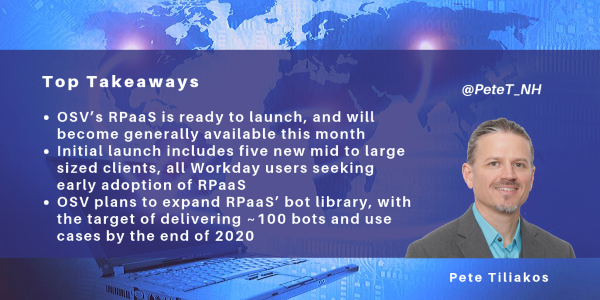Search posts by keywords:
Filter posts by author:
Related NEAT Reports
Other blog posts
posted on Sep 16, 2019 by Elizabeth Rennie

Last October at Workday Rising in Las Vegas, OneSource Virtual (OSV) introduced RPaaS, a Robotic Process as a Service offering, and the first HR-focused robotic process automation as a service solution targeted toward the mid-market buyer.
RPaaS is a 'turnkey RPA solution’ that eliminates the need for adopters to make substantial investments in developing advanced automation capabilities, making the emerging capability more affordable and accessible to midsized organizations seeking to leverage the technology to enable digital HR transformation. (For more background on RPaaS, see my blog dated November 2018: 'OneSource Virtual Delivers Turnkey RPA with RPaaS.com’)
With Workday Rising 2019 weeks away, and marking the first anniversary of RPaaS' introduction, I checked in with OneSource Virtual’s executive leadership to see how the offering has progressed so far, and its roadmap and future plans moving ahead.
RPaaS progress
In June, OSV announced it had finalized its selection of an automation platform for RPaaS, engaging Automation Anywhere as its go-to-market partner for RPaaS.
Since its launch last year, OSV has been quietly piloting the RPaaS original library of bots to support HR use cases for payroll data validation, timekeeping, life event monitoring, and 1099 data scrubbing. Over a multi-week timeframe, four early RPaaS adopters from OSV’s client advisory board piloted the bot capabilities.
With the success of the initial pilot and increasing demand from both its existing client base and prospective buyers, OSV released a soft launch of RPaaS for general availability beginning September 1st, with a more formal launch to occur by the end of September.
The initial launch will include five clients for RPaaS, all Workday adopters, derived from a mix of middle and large market organizations, and all new client labels for OSV. The initial five clients will begin working with OSV later in September to roll out the bot library against select use cases for operation by their internal HR team.
The future for RPaaS
OSV is also planning to roll out the RPaaS capability for use within its own delivery model, in support of its existing clients. It will work with clients to opt-in (requires security access for bots to client Workday instances, similar to that of a traditional back-office resource), and begin rolling out the capability by the end of October to client adopters.
OSV will also begin rolling out bots in support of its managed garnishment services offering, an inherently high-touch, complex, and compliance-impacting process. The bots, combined with optical character recognition (OCR) and machine learning, will scan and extract garnishment order details for processing. OSV will begin using the capability with ~10 clients by October, with plans to roll out the capability against all managed garnishments clients’ longer term.
From a roadmap perspective, OSV will continue to develop its RPaaS capability, aiming to address key repetitive HR and payroll tasks and inquiries through automation. OSV plans to expand its bot library, with the target of delivering ~100 bots and use cases by the end of 2020.
RPaaS’ next wave of use cases will center on automating repeatable HR and payroll audits to eliminate rework, drive compliance, and allow practitioners more time to focus on value-added tasks.
OSV envisions enabling RPaaS with 'digital workers', which leverage a group of 5 to 8 task bots that can be aligned to a specific set of activities commonly managed by humans. Examples include a 'payroll digital worker’, focused on automating repeatable activities throughout the payroll process, including pre-processing, gross to net processing, and post-processing reports, audits, and validations. OSV is also targeting enabling a 'HR compliance auditor' to automate auditing the full employee lifecycle of activities that can trigger compliance-related risk. Longer-term, OSV sees an opportunity to enable deeper automation for repetitive activities associated with benefits and recruiting administration.
Looking ahead, the success of RPaaS not only can provide OSV with a new revenue stream; it also has the potential to enable a pipeline of potential managed services buyers. By engaging an organization with a standalone offering such as RPaaS, OSV can expand the relationship longer term to include a range of managed HR, finance, and Workday support services, as the client grows, or its needs shift.
Longer term, OSV may have an opportunity to further its RPaaS reach and brand recognition by enabling the solution for potential consumption through the application marketplaces of its key partners such as Workday and Automation Anywhere.
The challenge for OSV lies in navigating the inherent difficulties associated with launching and commoditizing next-generation solutions like RPaaS as an early entrant. However, given OSV's history of disruption in the HR services space, I expect RPaaS will be a success and should provide OSV with deep expertise it could leverage longer term to establish a consulting practice and offering aimed at helping organizations navigate and establish digital HR centers of expertise.
OSV is already seeing increasing interest in the offering from both existing clients and external Workday buyers seeking to leverage intelligent automation within their HR delivery models. I expect OSV will see its RPaaS adoption steadily escalate in the coming 12-18 months, driven by organizations continuing to invest in digital transformation enablers.
